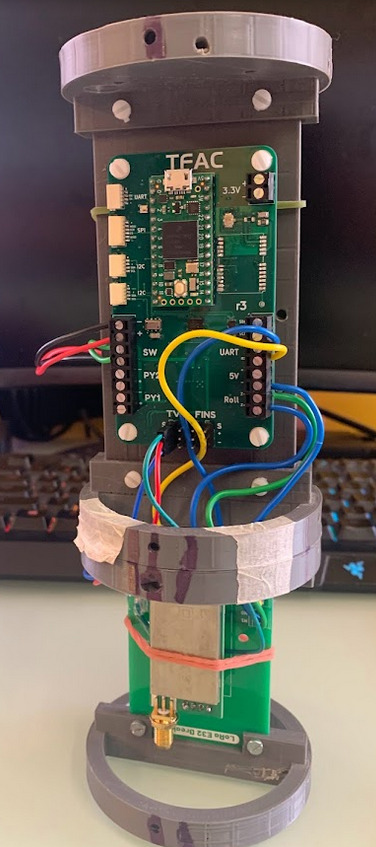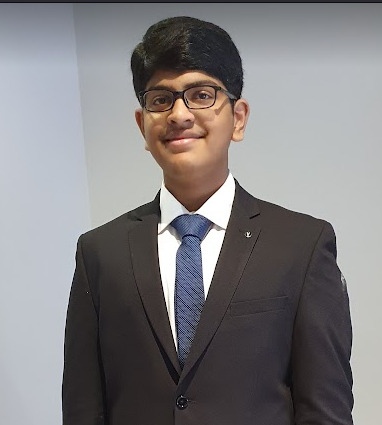How did you get into Experimental Rocketry while still at school?
I have been deeply fascinated with rockets and space for quite some time. My experimental rocketry endeavours started in the 6th grade during the first lockdown of the COVID-19 pandemic. I had a lot of free time and started learning more about how rockets work, I had also been watching a lot of YouTube videos of model rockets, so I thought of building a small model rocket with some electronics to measure the altitude. At that time I thought that it would be a short 3 month project, but here I am 3 years with a lot of skills under my belt and still really interested in experimental rockets!
How have your Parents supported you during this period when studies are considered more important?
My parents have been very supportive of my “outside-of-school” activities. They’ve provided me with the tools, parts, and opportunities necessary to pursue my passion. Until this point, I had been able to balance both my schoolwork as well as my projects. Now, however, as I am gearing up for my 10th-grade board exams I have had to focus a little more on my studies rather than rockets.
Have you received any Mentorship from any Individual as part of your learning curve? What is a Mentors role?
I have not received much technical mentorship as such, and most of what I’ve learned has been through YouTube videos, iterative design, learning by doing, and a whole lot of failure. I believe that a mentor’s role is not just to educate someone, but to inspire them, connect them with others, and help them grow. My mentors have been Mr Rajesh and Mr Shri AVM (Retd) Suresh Sir of Vihaan Spacetech. They’ve graciously allowed me to use their launch site and manufacture the motors required to launch my rockets and have provided me with a lot of advice on how to improve my rocket-building techniques. My mentor has also been my father. He’s the one who sparked my interest in space and technology and pushed me to seek professional mentorship, post my work online, and has just generally supported me throughout my journey

Describe your feelings when you made your first live, on stage presentation in front of University and ISRO officials?
It was quite nerve-racking when I made my first on-stage presentation. I had never done public speaking until that point or even spoken to a crowd of that many people before but as my presentation progressed I let go of that stage fright because I saw that several people in the audience were fascinated by my work. Then I realized that my presentation was effective in both showcasing the work that I’ve done and also in inspiring people to pursue what really fascinates them.
Tell us briefly about the development of the MK-1 Rocket you plan to launch later this year?
Air MK1 is my first step into high-power rocketry and the first rocket I’ve built. I built Air MK1 to get my hands dirty with building rockets (as I had only worked on designing, building, and testing flight computers before that), and also to test out my flight computer TFAC. Air MK1 is around 1.15 meters long and has a dry mass of 1.4kg. It is built out of a 78mm diameter cardboard tube with a 3D printed nosecone at the top, and four plywood fins at the back. Air MK1 is made of two sections of cardboard tube joined by a coupler. The forward section is the sort-of payload section and will hold my avionics stack, and the aft section will hold the motor-mount assembly and the recovery devices. Air MK1 is designed to fly to an apogee of around 400m on a H73J equivalent rocket motor. The parachutes will be deployed by the motor’s ejection charge, my flight computer is a passive payload and will be logging data to test out the software of my flight computer so it can be used to recover rockets later down the road.
Describe briefly the Specs of the Flight Controller you have designed and produced to guide your Model Rocket?
My flight computer is called TFAC (Third Flyable Avionics Computer). It is the fourth flight computer I have designed and built and the only working flight computer I’ve made. At the heart of TFAC is a Teensy 4.0 microcontroller. TFAC has a 10DOF sensor suite with a BMI088 IMU, an MS5607 barometer, and a LIS3MDL magnetometer. Additionally, TFAC also has a uBlox NEO-M9N GNSS radio with a U.FL antenna. In terms of datalogging TFAC has two memory devices. A flash chip where data from all the devices is logged to in-flight and a Micro-SD Card slot where the data stored in the flash chip is dumped after the rocket has landed. The sensors communicate with the microcontroller via the I2C interface, and the memory devices use SPI. Additionally, TFAC has 2 load-switch-based Pyro-Technic channels, four servo outputs, an LED, and a buzzer along with a plethora of I/O such as power outputs and communication outputs. TFAC can be powered by a 2s or 2s LiPO battery for which it has a step-down buck converter. TFAC uses an Ebyte-E32 Transceiver for sending telemetry data to an identical receiver on the ground, data is displayed on a Ground Control UI written by me. More information on TFAC can be found here on my website: https://www.abhignay.com/documents
What are the challenges you are facing as you engage in this activity?
The main challenge that I face as I build rockets in India is a lack of government regulations and just a lack of information on how to safely engage in the hobby. Before I met my mentor I had no way of launching my rockets, procuring parts, and making motors. Now that I am working with an aerospace company to launch my model rockets I have access to launch sites and rocket motors, but as a student, without those connections, I would have no way of flying my rockets.
What are your Career Plans?
As of now I am unsure of what exactly to pursue as my career. I do want to work on real rockets and satellites in the future, but I am undecided on the specifics. I am leaning towards Electrical Engineering or Mechanical Engineering though, but again I am not 100% decided yet.
Have you met school students who are engaged in Model Rocketry?
I haven’t met many school students who are engaged in model rocketry, but I know that quite a few are interested. I believe that this has to do with the scarce guidance that can be found online with regard to the hobby. The entry-barrier for model rocketry in India compared to other countries like the US is quite high and it can be quite daunting if you are not ready to go all in to model rocketry
What is your message for children interested in Aerospace as a Career?
My message to students interested in Aerospace and Model rocketry is that if you really like aerospace you should start working on it right now! Experiment, fail, succeed, the learnings you get by constantly iterating, fine-tuning, and failing at your work are extremely valuable. I strongly feel that if you want to get into something you should go all-in and not be afraid of failing, but you should be ready to persevere because very rarely will things work on the first time. If you frame your failures and look at what went wrong you are learning about it in the best and most valuable way possible!


